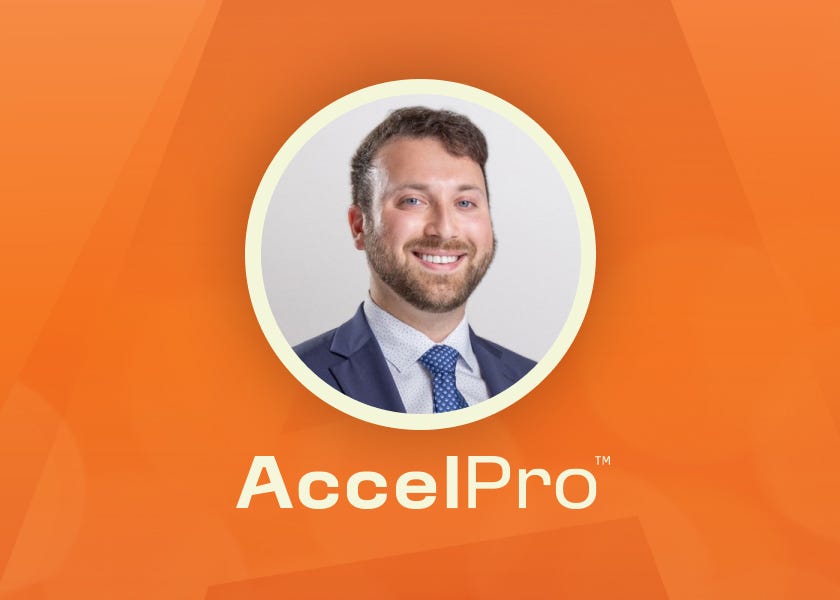Listen on Apple Podcasts, Spotify and YouTube.
Welcome to AccelPro IP Law, where we provide expert interviews and coaching to accelerate your professional development. Today we’re featuring a conversation with Evan Naar, Corporate Counsel at WHP Global.
Naar is the co-host of End Scene, an entertainment law podcast, and former Assistant General Counsel at Beanstalk. Naar discusses licensing agreements, brand extensions and what practitioners should understand about the process.
Note this interview was recorded in April 2024 and the answers reflect Naar's previous position at Beanstalk.
“Entertainment companies have a close hold on these brands,” explains Naar. “They protect them to make sure there's not a naked license, where the license goes unchecked and used in any way without checks and balances.
We have a robust section of the licensing agreement where it's very clear that the licensor will see pre-production samples and production samples at different stages. Then there's a quality assurance team. They sometimes go to the location where the food is being manufactured.”
Listen on Apple Podcasts, Spotify and YouTube.
Interview References:
Evan Naar’s LinkedIn profile and Practicing Law Institute profile.
Naar’s podcast, End Scene.
15:55 | Stone, Michael. (2018). The Power of Licensing: Harnessing Brand Equity: Harnessing Brand Equity. Ankerwycke.
TRANSCRIPT
I. LICENSING AGREEMENTS & BRAND EXTENSIONS
Neal Ungerleider, Host: What is a licensing agreement and how does that factor into brand extension?
Evan Naar: Let’s start from the basics. In a licensing agreement, you have two parties: The licensor and the licensee. The licensor is the party that owns the famous trademark. For example, Kellogg’s is one of my clients. Kellogg's owns Pop-Tarts, Eggos, Froot Loops, you name it; all these brands that we come to know and love.
Then there's a third party, a licensee who wants to pay an amount, usually in the form of royalties, to the licensor for the right to use that trademark on consumer products, in a TV show, in a movie, in a talent agreement, etc. We then enter into a licensing agreement and brand extension. What Beanstalk specifically specializes in is bringing the core message of the brand, think of Kellogg’s, into different product categories.
One of the deals that I worked on that was very successful was Pop-Tarts, another brand owned by Kellogg — Pop-Tart branded and flavored ice cream. You wouldn't traditionally think of that when you think of cereals, strudels etc. We look to get into different areas, whether that's merchandising or food that is a little bit different than the core offering that the licensor specializes in.
NU: What are some of the main legal considerations practitioners should keep in mind when negotiating licensing agreements for brand extensions?
EN: “IP is king” is the phrase that we often hear. You're only as good as your intellectual property. That's why these entertainment companies, the big corporations, really have a close hold on these brands. They protect them to make sure there's not something called a naked license, where the license goes unchecked and used in any way without checks and balances.
We have a very robust section of the licensing agreement where it's very clear that the licensor will see pre-production samples and production samples at many different stages. Then there's a quality assurance team. They sometimes go to the location where the food is being manufactured or the warehouse.
One of the most important things if you're on the licensor side is making sure that your client has protection and is able to see things from soup to nuts, in terms of being in that conversation to make sure, for example, the color is right. Maybe Tony the Tiger has a specific tint of orange that you want to use. Sending a lot of these forms that lay everything out to the licensee is imperative.
Another consideration is the ownership of intellectual property. It makes sense that the licensor, the one who owns these marks, might want to own the intellectual property of the product at the end of the day. But then you may have some conflicting interests here.
You have the licensee who might have a patent on one of the products that you are sticking the logo on. Of course, they want to maintain their intellectual property so that Kellogg’s, Stanley, Black and Decker, Paramount, whoever it may be, doesn't reverse engineer the product and end up with intellectual property and ownership of this patent that the licensee worked hard to create.
Being in sync with your client; what flexibility do they have here with the ownership? Are they okay in this Pop-Tart ice cream example that the licensee has ownership of the product? Or does Kellogg’s really want to maintain ownership here? That's a hugely redlined part of discussion during these deals.
NU: How important is due diligence in the process of developing a brand extension, especially from a legal standpoint?
EN: Due diligence requires legal minds in that you want to enter into different realms that your client is not always in. We talked about this with ice cream. Another client that we had is Diageo, who owns Guinness. People love Guinness. They travel to Ireland, where they have the Guinness storehouse. It might make sense to make a Guinness-flavored ice cream or a Guinness-flavored pasta, which we have done, but it might not make sense to make a Guinness-flavored toothpaste.
It takes due diligence and market research on where this brand might make sense. Dilution can come into play here. You don't want to enter into a market that's too saturated. You don't want your brand to become the next meme. You don't want a Guinness flavored toothpaste all over Twitter. It's about considering what makes sense. This isn't too legal, but those are some considerations you need to think of when entering into these agreements.
—
II. THE BRAND EXTENSION LANDSCAPE
NU: How does the legal landscape surrounding brand extensions differ between entertainment properties and other types of brands such as consumer goods or services?
EN: With consumer goods or services, there's inherently a bit more risk. When we're dealing with merchandising of famous characters, let's use Mickey Mouse on a t-shirt as an example. Going back to the approvals that I was mentioning earlier, you want to make sure that the Mickey character is aligned with what Disney approves.
But when we're talking about food and things of that nature, you can make a Mickey ice cream bar, for example. That can inherently carry a little more risk because there could be someone who has an allergic reaction, or there can be issues in the plant where they make the ice cream.
I think that's a little bit different when you're talking about general entertainment properties, when you're talking about licensing. I'll use another Disney character, Moana, who might appear in a video game. That does have to do with licensing and extending your brand, but when you're talking about making a Moana ice cream? I think there's some more risk there.
When there are consumer products that are at the forefront, which is what I primarily deal with, you're going to want to think about this from a risk lens, and have some language in there that buttons up who's responsible for what.
Disney is not one of our clients, but I'm using it as an example. They want to be indemnified. Indemnification is a huge part of the negotiation process. They are trusting the licensee, the ice cream maker that's licensed the Mickey character, to make this ice cream.
Why should Disney be sued if someone gets sick and ends up in the hospital when all they're doing is providing product approval? They’re giving the Mickey character and perhaps giving some feedback on how it tastes. That's another consideration. And again, that's with consumer products.
So when it comes into the real world with consumer products, there can be more risk and you have to be aware of that. That’s a circular way of answering your question.
NU: Can you tell us a little bit about how licensees prospect for and connect with licensors when they want to make brand extensions in areas where they don't currently have products or services?
EN: I think it's a little bit of give and take on both sides. It could be the licensor or you could have a party like Beanstalk. We're the middleman between licensor and licensees.
There's a ton of prospecting calls where we will go out, not the attorneys but the business folks, and see that a licensee specializes in making these playground sets. They've done it with Tony the Tiger. They've done it with the Teenage Mutant Ninja Turtles. It might make sense for them to do a product with Mickey Mouse, so let's reach out to them.
It's a very small world. I feel that if you are a licensee and you're looking to get in touch with a licensor, they will either find you, or if you keep on putting out good products, your name will be out there.
There are many crossover licensees at my company where we have worked with them for one brand and then we’ll reach out to another brand as well. So I have some familiarity with the attorneys on the other side who can say, “Oh, we worked with you for this other thing.” Again, small world.
NU: Do you have any recommendations for attorneys and practitioners working with business people in this process?
EN: It's all about setting expectations. One thing that I've wrestled with in my career is that the business team always wants to get the deal done. And can you blame them? That's where the money comes from and you want to make sure that you make the client happy.
But at the end of day, as attorneys, we have to sometimes push back and level set. I always say that you want to under-promise and over-deliver. Tell them when you think you're going to get the red line back to them. Tell them, “What do you mean by ‘they could sell in ecommerce?’ Is it ecommerce for just that specific retailer? Is it ecommerce on Amazon? What specific websites are you talking about?”
For example, in the channels of trade grant that I'm including in the agreement, have an open dialogue between both sides. It can go a long way.
So level set, manage expectations, and then reiterate to them that you're both working towards a common goal.
—
III. PATHWAYS TO BRAND EXTENSIONS
NU: What was your pathway to the licensing and brand extension world like?
Evan Naar: While I was at New York Law School school, I took intellectual property, entertainment law, IP, licensing, and copyright courses, all which really built a foundation. Then reading these cases and looking at real world examples that my professor showed was interesting.
I think licensing is a core component of entertainment. It's a multi-billion dollar industry and it's how a lot of these companies make a ton of money. IP is king; that's why you see so many Ghostbusters movies, and then "moichendizing!" as Mel Brooks says in Spaceballs. It's all about merchandising, capitalizing on this IP that you've had for decades.
That really interested me: being a part of that process where as attorneys, I don't want to say we act as gatekeepers, but we're integral in the process of these negotiations and making sure that one side isn't having a windfall over the other.
That's what led me to Beanstalk. We're unique in that we sit in the middle between licensors and licensees. And seeing how that all works is what led me there. Then, of course, my internships at Discovery, working at Romano Law, a law firm, and then Central Entertainment Group, a talent agency. All of these things combined thrust me into the world of entertainment, and licensing is such a core component of it.
And licensing is uniform. What I mean by that is you're going to see a ton of the same clauses: the approval rights which I mentioned; the minimum guarantee royalty, which is how much the licensee needs to pay usually on a quarterly basis to the licensor for the rights to use this brand; limited liability; the intellectual property which I also mentioned—who owns it at the end of the day? There's a lot of transferability.
So the examples of the Mickey Mouse play set or Mickey Mouse being in a video game might be different than a Mickey Mouse ice cream. But there are commonalities between the three of those.
What amazes me is just how much we see it in our everyday lives. Every item that you buy at the movie theater, at Hot Topic, at Walmart. Almost all of it is licensing unless the company does it in-house, which might not be cost effective for them to do. So they outsource it, which is where brand extension comes in.
NU: Do you have any advice for listeners who are interested in entertainment law as a career?
EN: First of all: Network, network, network. By listening to this podcast, by going to events, you're doing the right thing for sure. I've gotten a lot of my jobs through having good relationships with people and people that could vouch for me. Leaving a good impression on people and networking more specifically for entertainment.
I also think it's very important to read the trades. Get an email blast at the beginning of the day that summarizes what’s happening, whether that's Timothee Chalamet's first-look deal with Warner Brothers or Dua Lipa being sued for copyright infringement, it's all important. And it does come up in conversation.
I have an anecdote that I'll share very briefly. I was at a networking event and I started chatting with a high level entertainment executive. I introduced myself and then I said, “What are your thoughts on X?”
This was something that happened maybe a month prior that directly affected the company. I only knew about this because I was up to date on what’s happening.
And, shameless plug, there’s the podcast that I co-host as well. We talk about entertainment related topics on End Scene. Find these resources, and read books too. The creator of Beanstalk wrote a whole book on licensing — his name is Michael Stone, if you want to check that out.
Again, I cannot underscore enough the relationship component of this industry.
NU: Can you give an example of a time when a peer helped you with a challenging moment in your career?
EN: It's happened so many times — it's all about having people that you can rely on and be a crutch for at the end of the day. I know lawyers get this bad rap where we're heartless people, but at the end of the day, we are human. It is a stressful job. You could spend hours negotiating agreements.
Many people that I've worked with and who have been in classes with me in law school have been there during tough times, when I've been stressed. I always try to put myself out there and people have done the same for me.
Listen on Apple Podcasts, Spotify and YouTube.
This AccelPro audio transcript has been edited and organized for clarity. This interview was recorded on April 11, 2024.
AccelPro’s expert interviews and coaching accelerate your professional development. Our mission is to improve your day-to-day job performance and make your career goals achievable.
Please send your comments and career questions to questions@joinaccelpro.com. You can also call us at 614-642-2235.
If your colleagues in any sector of the IP law field might be interested, please let them know about AccelPro. As our community grows, it grows more useful for its members.












